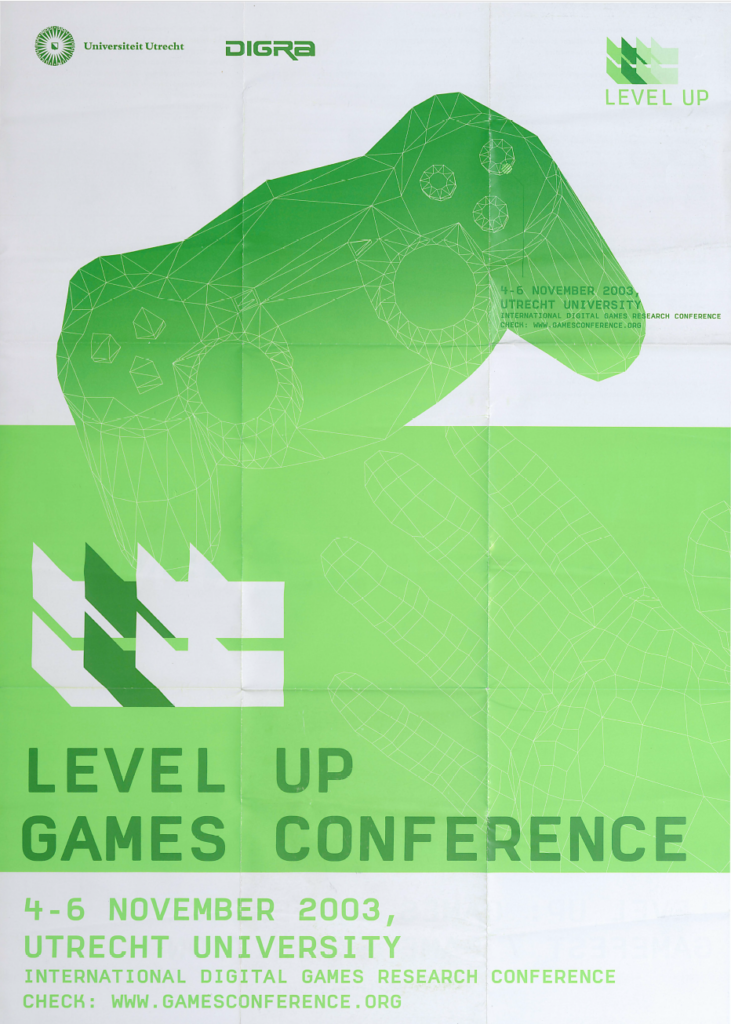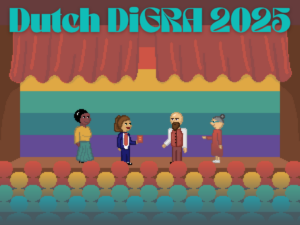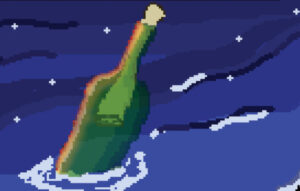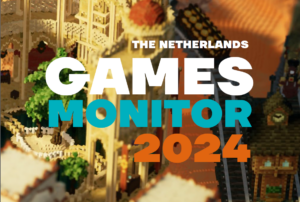
“we imagine that many readers immediately decided that [games research] was not relevant to their research. […] While quantitative studies and media effects work on video games are often treated as more naturalized to the topic, theory work in video game studies often speaks within an echo chamber.”
Shira Chess and Mia Consalvo in “The future of media studies is game studies”
This article is the first part of a series of articles based on internship research within the Utrecht Center for Game Research conducted by Amy Lycklama as part of the completion of the MA New Media and Digital Culture.
The study of games and play in the Netherlands has a lengthy and impressive history. Johan Huizinga, who wrote Homo Ludens all the way back in 1938, is seen as a key figure in the history of the study of play and games. Focusing on digital games, Utrecht University hosted the inaugural Digital Games Research Association (DiGRA) conference back in 2003. Well before and ever since events like these, game research has been part of both research and educational programmes within Utrecht University as well as in other Universities and Universities of Applied Science throughout the Netherlands.
Several years ago, the original website for the 2003 inaugural Digital Games Research Association (DiGRA) in Utrecht was relaunched, including the proceedings, videos of the original keynotes, a photo gallery, and more. Have a look HERE.
The field of game research is, as many will tell you, a diverse and intersectional field, one that has been “relegated to a kind of theoretical outsider status” (Chess & Consalvo, 2021, p. 159). Yet game research and game development have a reach that extends beyond the game sector. Tools such as Unity are increasingly applied in situations beyond game development and more companies are stepping into the game production sphere. Games “are dispersed throughout all industries, not just in overt ways but in subtler ways such as gamification in streaming services, and the increasing reliance on games as a part of transmedia storytelling” becoming increasingly integrated into different modes of production and the media convergence continues to expand (Chess & Consalvo, 2021, p. 160).
The diverse number of applications for game research are highlighted in Chess and Consalvo’s article. The wide and diverse nature of game research is also further reflected in the way in which the research field has diversified and split itself off in a large variety of intersectional focus areas. These areas include sub-groupings such as games in education, eco-games, or serious games. Serious games, also spoken about as applied games, in specific make up a large portion of the Dutch games market, with roughly a quarter of “Dutch game companies [having involvement] in the development of applied games” according to the 2022 Dutch Games monitor (van Grinsven & Manshanden, 2024, p. 11). This overlap, between academic fields of game research and the production of serious games which often rely on the legitimizing power offered by academic institutions, showcases that there is a two-way street between industry and academia- and that the identity and perceptions of one will play into the perception and identity of the other.

Van Vught and Glas highlight that within the Dutch game related educational sector (one that covers both theory-based university education and the more practical university of applied sciences approach), “students with a game design background are now found in every sector of the media and technology industry, showing that an industry’s perceived but also actual potential does not just lie in its most visible and recognizable product, the game” (2021, p. 698).
Chess and Consalvo state that “video games should matter to media studies scholars, broadly, because as convergence culture becomes less of a special case and more of an everyday reality, the medium itself matters less” (2022, p.160). This loss of the medium as a marker of identity shifts the burden onto other aspects and characteristics of game research. Understanding the identity of game studies, and if there is such a thing as a uniquely Dutch version of the field reflects beyond the bounds of games themselves, and into the wider world suddenly becomes more relevant, without medium related identifiers to lean on. From advertisements, to education, to the design of urban spaces, and all the way to the governmental level, the impact of games is felt, and situating the position of the research field among that may offer some insight into the role playful media and games will continue to play in an ever-evolving world, but is there something in that that those working at the UU feel make it uniquely Dutch?
The Question
While previous work has aimed to identify the characteristics specific to the Dutch game industry (van Grinsven and Raessens 2015; Lenting 2019), no such attempt has been made for Dutch game research.
Is there a specific Dutch identity to the game research conducted in the Netherland? Or at the UU? To further explore this line of thinking, I want to pose the following question; How do people working in game research at the UU self-describe the identity (or lack thereof) of Dutch game research?
Along with this question, I also wonder if there are any commonalities in how those I interviewed self-identify within game research, if there is something as broad as Dutch game research, and what others might think the future of game research could look like.
To explore these questions I interviewed multiple people, each with different backgrounds, and different experiences with game research and with the ways in which game research intersects with other disciplines. With them I discussed their own interpretations of the field, and how their varied backgrounds help expand and strengthen the role this field of study plays in the current digital age.
The results of this research will feature in the next part of this series, so stay tuned…
Bibliography
- “Level up Revisited.” 2024. Level Up Gamesconference. Accessed July 4. https://digra2003.org/.
- Chess, Shira, and Mia Consalvo. 2022. “‘The Future of Media Studies Is Game Studies.’” Critical Studies in Media Communication 39 (3): 159–64. doi:10.1080/15295036.2022.2075025.
- Glas, René and Jasper van Vught. “The Netherlands”. In: Wolf, Mark J.P.. Encyclopedia of Video Games: The Culture, Technology, and Art of Gaming – 2nd Edition. Santa Barbara: ABC-Clio, 2021. pp. 696-699
- Lenting, Tom. 2019. Gamegeschiedenis van Nederland: 1978-2018. Arnhem: Karel van Mander Academy.
- van Grinsven, Christel, and Joost Raessens. 2015. “The Netherlands.” Essay. In Video Games Around the World, 359–76. Cambridge, Massachusetts : The MIT Press.
- van Grinsven, Christel, and Walter Manshanden. 2024. “Games Monitor 2022.” Dutch Game Garden. Dutch Game Garden. https://www.dutchgamegarden.nl/games-monitor-3/.





